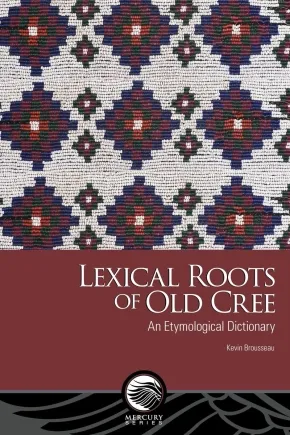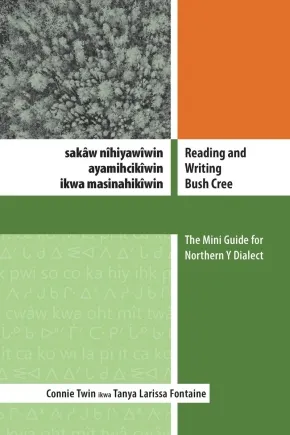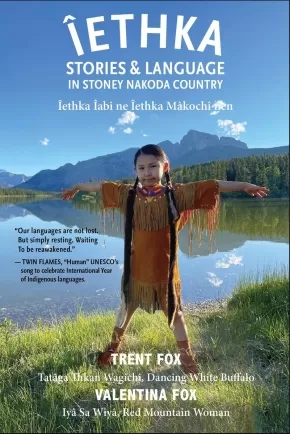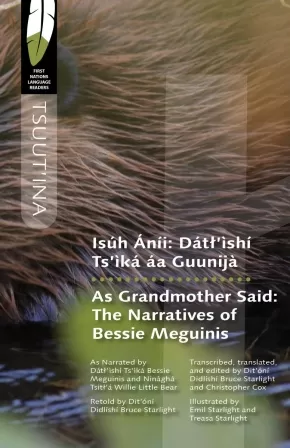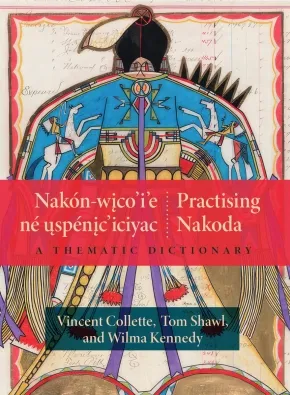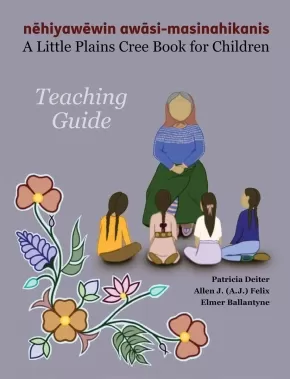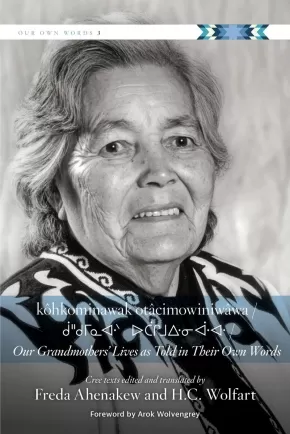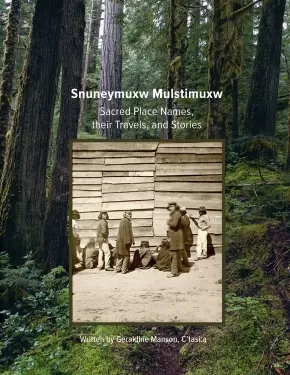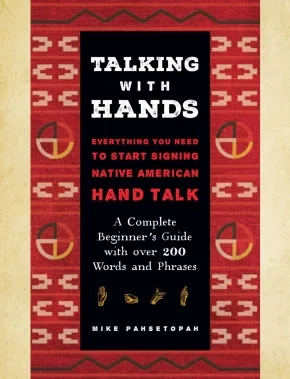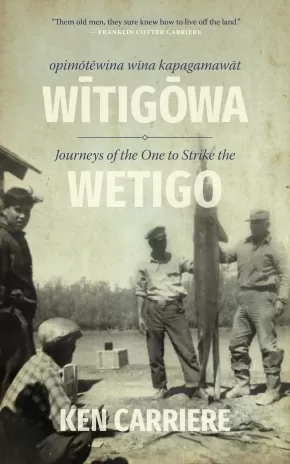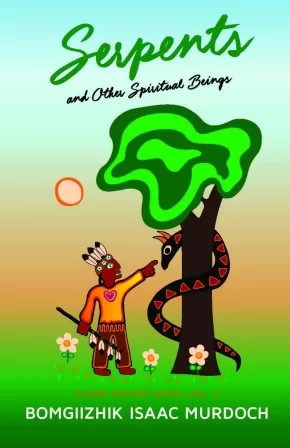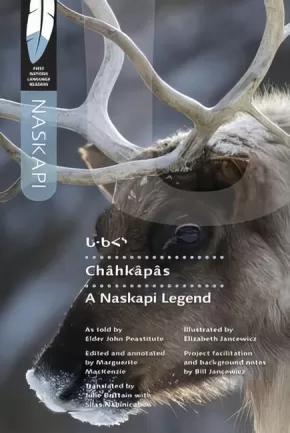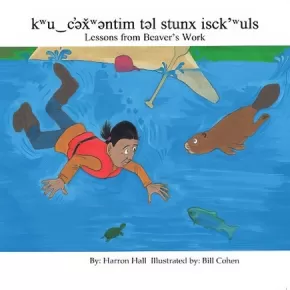
Language Learning
1
-
15
of
33 Results;
Sort By
Go To
of 3
Lexical Roots of Old Cree: An Etymological Dictionary
$59.95
Format: Paperback
Text Content Territories:
Indigenous Canadian; First Nations; Cree (Nehiyawak);
ISBN / Barcode: 9780776645490
Synopsis:
Synopsis:
Lexical Roots of Old Cree: An Etymological Dictionary is the result of over two decades of research on historical and contemporary Cree dialects. Built from extensive linguistic fieldwork with nearly a hundred fluent speakers and supported by lexical databases and textual corpora, it offers a detailed reconstruction of Old Cree roots and their evolution across dialects such as Moose Cree, Southern East Cree, Atikamekw, and Western Innu.
Lexical roots—the smallest meaningful units of words—are central to Cree’s polysynthetic structure, where words can function as entire sentences. By meticulously tracing these roots, this dictionary provides critical insights into how words were formed in Old Cree and how they continue to be structured in modern dialects.
Beyond linguistic reconstruction, this work addresses practical challenges in Cree lexicography, particularly those arising from orthographic variations and dialectal differences. It serves as a valuable resource for lexicographers, linguists, and community members engaged in language preservation and revitalization.
The research draws from historical manuscripts, early dictionaries, and oral traditions, ensuring a comprehensive and evidence-based approach to linguistic analysis. At a time of rapid linguistic erosion, this dictionary not only documents Cree’s rich lexical heritage but also supports ongoing efforts to sustain and strengthen the language for future generations. It stands as a testament to the knowledge generously shared by fluent speakers and to the enduring vitality of Cree linguistic traditions.
Additional Information
520 pages | 6" x 9" | Paperback
Reading and Writing Bush Cree: The Mini Guide for Northern Y Dialect
$34.95
Format: Paperback
Text Content Territories:
Indigenous Canadian; First Nations; Cree (Nehiyawak); Woodland Cree;
Reading Level: N/A
ISBN / Barcode: 9781550599855
Synopsis:
Synopsis:
A Vital Resource to Preserve, Teach, and Live the Bush Cree Language
Reading and Writing Bush Cree is a heartfelt, practical, and approachable guide for fluent speakers and Cree language educators who want to learn to read and write sakâw nîhiyawîwin—Bush Cree, or the Northern Y dialect. Written by Connie Twin, a first-language speaker from Bigstone Cree Nation in northern Alberta, and Tanya Fontaine, a dedicated Cree language learner and educator, this book bridges oral fluency with written literacy to support language preservation and revitalization.
Through personal stories and cultural insight, the authors guide readers into the structure of Cree grammar and the use of Standard Roman Orthography (SRO). With clear examples of both fluent and full written forms, this book also sheds light on how Cree sounds are represented in writing and highlights important differences between Northern and Southern Y dialects.
This is more than a how-to book—it’s a call to keep sakâw nîhiyawîwin alive for future generations.
Features
- A first-language speaker’s perspective on learning to read and write Cree
- Focus onsakâw nîhiyawîwin (Bush Cree / Northern Y dialect)
- A step-by-step introduction to Standard Roman Orthography (SRO) and syllabics
- Need-to-know basics of Cree reading, writing, grammar, and Y dialect variation
Additional Information
116 pages | 6" x 9" | Paperback
Îethka: Stories & Language in Stoney Nakoda Country
$37.50
Format: Paperback
Text Content Territories:
Indigenous Canadian; First Nations; Stoney-Nakoda (Nakota);
ISBN / Barcode: 9781990735455
Synopsis:
Synopsis:
This book features the Stoney Nakoda First Nation language in context and in action. The book contains a collection of stories by Trent and Valentina Fox, with each teaching culminating in a learning section. To assist in nuances of the language, the book also includes audio components as web links. The Îethka Stoney Nakoda People are an integral part of the Treaty 7 group of Indigenous Nations in Southern Alberta. Their spoken language is part of the Dakota-Sioux linguistic group.
Educator Information
Recommended for ages 14 to 18.
Additional Information
144 pages | 6.00" x 9.00" | Paperback
Isúh Áníi / As Grandmother Said: Dátl'ìshí Ts'ìká áa Guunijà / The Narratives of Bessie Meguinis
$24.95
Format: Paperback
Text Content Territories:
Indigenous Canadian; First Nations; Dene; Tsuut’ina (Tsuu T'ina, Sarcee);
Grade Levels: 12; University/College;
ISBN / Barcode: 9780889779853
Synopsis:
Synopsis:
The first book published in Tsuut’ina—a critically endangered language—in over a century!
With fewer than 150 speakers, Tsuut’ina is a critically endangered language. Isúh Áníi / As Grandmother Said brings together nine traditional narratives and historical accounts in the Tsuut’ina language, originally narrated by Elders Dátł’ìshí Ts’ìká Bessie Meguinis (1883–1987) and Ninàghá Tsìtł’á Willie Little Bear (1912–1989). At once an act of language preservation and a learning resource, each story is retold in Tsuut’ina by Dit’óní Didlíshí Dr. Bruce Starlight and is presented with English translations and a Tsuut’ina-to-English glossary.
The narratives included in this collection cover considerable ground, ranging from the creation of the world in the caring hands of Xàlítsa-tsii and his animal helpers, to accounts of separation, migration, and cross-cultural contact that mark major turning points in Tsuut’ina history, and to important cultural and ceremonial items and practices that the Tsuut’ina Nation maintains to this day.
These stories will be of lasting value to Tsuut’ina language learners and teachers, and will share the legacy of Elders Bessie Meguinis and Willie Little Bear with generations of Tsuut’ina to come.
Reviews
"Intended as a learning resource, each story is paired with English translations, line-by-line interpretations, and a Tsuut'ina-English glossary. Additional notes provide background on the creation of the text, the life and contributions of Bessie Meguinis, and detailed linguistic analysis. This volume is an invaluable tool for language instructors wanting to preserve and revitalize the Tsuut'ina language but also serves as an introduction to the wisdom and history of the Tsuut'ina people for an English-speaking audience." - Dionne L.-B., High School Librarian, Indigenous Books for Schools
Educator & Series Information
This book is part of the First Nation Language Readers series. With a mix of traditional and new stories, each First Nations Language Reader introduces an Indigenous language and demonstrates how each language is used today.
This book is included in the Indigenous Books for Schools database from the Association of Book Publishers of BC. It is recommended for Grades 10 to 12 for English Language Arts and Social Studies.
Additional Information
186 pages | 5.50" x 8.50" | Paperback
Nakón-wico'i'e né uspénic'iciyac / Practising Nakoda: A Thematic Dictionary
$27.95
Format: Paperback
Text Content Territories:
Indigenous Canadian; First Nations; Assiniboine (Nakoda Oyadebi);
ISBN / Barcode: 9781779400185
Synopsis:
Synopsis:
A user-friendly guide that teaches core Nakoda vocabulary and how to use it in conversation
Practising Nakoda contains basic Nakoda vocabulary, organized into 30 themes (such as animals, clothing, directions, and time) and divided into sections meant to enhance daily and ceremonial communication (including dances, ceremonies, and ceremonial clothing). The guide provides words for every theme from which the reader can forge a general view of word formation patterns. In a thematic dictionary, words are not organized alphabetically but are grouped according to the root element or their meaning. Since Nakoda is a polysynthetic language where words are often built up with many elements that attach to the root, this is a necessary format that enhances the learner’s “morphological awareness.” The guide will help learners identify the root of each word, along with the “morphemes,” critical to the successful learning of the Nakoda language, and the comprehension of complex vocabulary.
Reviews
"Nakón wico’i’e né uspénic’iciyac / Practising Nakoda: A Thematic Dictionary is a user-friendly dictionary created to support learners of the endangered Nakoda language. More than just a list of words, this book helps users understand how to build sentences and use the language in real-life situations, even without a fluent speaker to guide them. The chapters are organized by theme, making it easier for learners to focus on everyday topics and vocabulary. This dictionary is meant to be a practical starting point for those beginning their Nakoda language journey. It was created with the help of many different Nakoda speakers, whose voices and knowledge shaped the content. This dictionary can be used for self-study, in classrooms, or as a community resource to support language programs. Practising Nakoda is a helpful tool for anyone who wants to begin learning and using Nakoda in their daily life." - Jackie L., Educator & Indigenous Voice Consultant, Indigenous Books for Schools
Educator Information
Table of Contents
Foreword
Elements of Nakoda Grammar
Abbreviations
Greetings and Forms of Address
Human Body
Food and Drinks
Clothing and Getting Dressed
Living Arrangements
Human Characteristics
Feelings, Instincts, Emotions, and Motives
Thinking
Behaviour and Mental Disposition
Abilities and Talents
Expressing Thoughts and Feelings
Making Evaluations
Family and Friends
Social Relations
Education and Schooling
Professions and Trades
Agriculture, Gardening, and Ranching
Banking, Money, and Commercial Transactions
Leisure and Sports
Dances and Ceremonies
Spirituality and Culture
Communication
Nationalities and Settlements
Geography and Landscape
Weather, Natural Phenomena, and Substances
Fauna and Flora
Transportation and City Infrastructure
Quantities
Space and Time
Structural Words
Bibliography
About the Authors
This book is included in the Indigenous Books for Schools database from the Association of Book Publishers of BC. It is recommended for Grades 9 to 12 for Language studies.
Additional Information
216 pages | 5.51" x 7.51" | Paperback
nēhiyawēwin awāsi-masinahikanis: A Little Plains Cree Book for Children—Teaching Guide
$74.95
Format: Coil Bound
Text Content Territories:
Indigenous Canadian; First Nations; Cree (Nehiyawak); Plains Cree;
ISBN / Barcode: 9781778690273
Synopsis:
Synopsis:
A Little Plains Cree Book for Children—Teaching Guide contains lesson plans, student assignments, and other helpful information for teaching the Plains Cree language—a companion to nēhiyawēwin awāsimasinahikanis: A Little Plains Cree Book for Children: A Reference for Teaching the Plains Cree Language, the content of which focuses on terms familiar to the First Nations Cree people of Saskatchewan and follows curriculum for Kindergarten to Grade 12.
Reviews
"Suitable for elementary school-aged children, typically from kindergarten through early elementary grades (K to 5), the book aligns well with language arts and social studies curricula that emphasize multicultural perspectives and language revitalization efforts. Educators can integrate it to enhance students' language skills, deepen their understanding of Indigenous cultures, and promote cultural sensitivity in the classroom. By using this resource, educators not only support language revitalization goals but also empower students to appreciate and respect diverse cultural heritages, fostering a more inclusive educational environment that values Indigenous Knowledge and Traditions." - David D., Indigenous Educator & Administrator, Indigenous Books for Schools
Educator Information
Find the companion resource here: A Little Plains Cree Book for Children: A Reference for Teaching the Plains Cree Language
A colouring book companion is here: A Little Plains Cree Colouring Book: Plains Cree People
This resource is included in the Indigenous Books for Schools database from the Association of Book Publishers of BC. It is recommended for use with K to 5 classrooms for English Language Arts and Social Studies.
Additional Information
128 pages | 8.50" x 11.00" | Spiral Bound
kôhkominawak otâcimowiniwâwa / Our Grandmothers’ Lives As Told in Their Own Words
$29.95
Format: Paperback
Text Content Territories:
Indigenous Canadian; First Nations; Cree (Nehiyawak); Métis;
ISBN / Barcode: 9780889779495
Synopsis:
Synopsis:
The 25th anniversary of a historically significant collection, presented in Cree and English.
kôhkominawak otâcimowiniwâwa / Our Grandmothers’ Lives is a collection of reminiscences and personal stories from the daily lives of seven Cree women over the past century, presented here in Cree and English. Recorded in their own language, these women share their memories of their lives and the history of their peoples, describing activities such as household chores, snaring rabbits and picking berries, going to school, marriage, bearing and raising children, and providing insights into the traditional teachings of a society in which the practical and spiritual are never far apart.
Reviews
"[T]hese ... are good stories to share ... and are absolute treasures." —Chelsea Vowel, author of Buffalo is the New Buffalo
"This book is a heartfelt collection of stories from Cree and Métis grandmothers. It shares their lives, traditions, and strength through carefully recorded and translated Oral Histories. Each story is told through the lens of the grandmother and gives a personal look into the lives and culture of these Indigenous women, showing their wisdom and resilience. The book is filled with intimate memories from each Elder, offering a glimpse into their experiences. Each memory is shared in both English and Cree. Ahenakew’s work highlights the importance of keeping these voices alive, helping readers understand the challenges and successes these grandmothers have faced. The book honours their contributions and is a valuable resource for anyone interested in Indigenous history, culture, and storytelling. Through their words, we see the rich experiences that have shaped their communities and the crucial role of Oral Traditions in preserving cultural identity." - David D., Indigenous Educator & Administrator, Indigenous Books for Schools
Educator & Series Information
This book is part of the Our Own Words series.
Presented in Cree and English.
This book is included in the Indigenous Books for Schools database from the Association of Book Publishers of BC. It is recommended for Grades 10 to 12 for English Language Arts and Social Studies.
Additional Information
418 pages | 6.00" x 9.00" | Paperback
Snuneymuxw Mulstimuxw: Sacred Place Names, their Travels, and Stories
$25.00
Format: Paperback
Text Content Territories:
Indigenous Canadian; First Nations; Salish; Coast Salish; Snuneymuxw ;
ISBN / Barcode: 9780865719903
Synopsis:
Synopsis:
Place names are powerful, and their significance extends far beyond words. Learning and embracing the original Indigenous phrases used to describe the world around us acknowledges the impact of colonization, recognizes First Peoples’ ongoing relationship to the land, and honours their traditional way of being. In Snuneymuxw Mulstimuxw, Traditional Knowledge Keeper and respected Elder Geraldine Manson, C’tasi:a offers an extensive survey of the history and meaning of local Hul’q’umi’num place names and origin stories of the Snuneymuxw First Nation.
Produced through a partnership between Snuneymuxw First Nation, Vancouver Island University, and New Society Publishers, this beautifully illustrated, full-colour booklet gathers and shares the rich history of the Snuneymuxw’s living landscape as passed down through generations from time immemorial. From how Xw’ulhquyum (Snake Island) and other sites of significance got their names to ancient stories such as the bringing of fire by Qeyux to the Tle:ltxw people, the cultural history chronicled in these pages provides a unique lens through which to view and understand nearby lands and waters.
In addition to the sacred cultural narratives distilled from the teachings of the Ancestors, Snuneymuxw Mulstimuxw delves into more recent historical events, told from the perspective of those who experienced them firsthand or whose families are still experiencing the intergenerational effects. This invaluable work is complemented by a series of maps integrating traditional Hul’q’umi’num place names into their present day context.
Educator Information
In Snuneymuxw Mulstimuxw Elder C’tasi:a offers an extensive survey of Hul’q’umi’num place names, sites of significance, and origin stories of the Snuneymuxw Nation.
Embracing the original Indigenous names for the world around us, this book acknowledges the impact of colonization and honours First Peoples’ ongoing relationship with the land.
Additional Information
42 Pages | 8.5" x 11" | Paperback
All proceeds from the sale of this work are donated to Youth and Elders events and youth who need finances to attend events.
Talking with Hands: Everything You Need to Start Signing Native American Hand Talk - A Complete Beginner's Guide with over 200 Words and Phrases
$32.99
Format: Paperback
Text Content Territories:
Indigenous American; Native American;
Reading Level: N/A
ISBN / Barcode: 9781577153665
Synopsis:
Synopsis:
Explore Native American culture and learn Hand Talk, also known as Plains Indian Sign Language, Plains Sign Talk, and First Nation Sign Language.
In Talking with Hands, professional Native American dancer, storyteller, and educator Mike Pahsetopah reveals the beauty of Plains Indian Sign Language, which was once used as a common language between the Indigenous peoples of the region now generally known as the Great Plains of North America. The language was used for trade, but also for storytelling and by the Deaf community, making it a very common and useful tool in society. Today, only a few native speakers remain.
This beautifully designed book makes practicing Plains Indian Sign Language easy and engaging. Learn the proper positions and motions of this now-rare language with photos and descriptions throughout the pages. Follow along with diagrams to perfect your abilities.
Learn how to use your hands to convey the meanings of over 200 common words. In this detailed guide, you will learn to sign words like:
- Hungry
- Camp
- Evening
- Angry
- Fire
- Owl
- Together
- Brave
- And more
Honor and carry on the culture of the Plains peoples by learning the sign language they shared.
Additional Information
168 pages | 8.30" x 10.35" | 100+ color photos | Paperback
A Little Plains Cree Book for Children: A Reference for Teaching the Plains Cree Language
$74.95
Format: Paperback
Text Content Territories:
Indigenous Canadian; First Nations; Cree (Nehiyawak); Plains Cree;
ISBN / Barcode: 9781778690044
Synopsis:
Synopsis:
A Little Plains Cree Book for Children contains useful noun categories, phrases, and some basic rules for the Plains Cree language. Following the themes of the Saskatchewan Curriculum Guide for Kindergarten to Grade 12 on Aboriginal Languages, the content focuses on terms familiar to the First Nations Cree people of Saskatchewan. This book should also be supplemented by total physical response (TPR) methods, in addition to teaching materials such as songs, games, and flash cards. Our hope is to encourage a basic understanding of the language so that learners are able to converse with Plains Cree speakers. The best path to fluency in the Plains Cree language is immersion, but learning one word at a time is a good place to start!
Educator Information
Recommended for ages 5+
A teaching guide can be found here: nēhiyawēwin awāsi-masinahikanis: A Little Plains Cree Book for Children—Teaching Guide
Find a colouring book here: A Little Plains Cree Colouring Book: Plains Cree People
Additional Information
96 pages | 8.50" x 11.00" | Paperback
âhkami-nêhiyawêtân / Let’s Keep Speaking Cree
$32.95
Format: Coil Bound
Text Content Territories:
Indigenous Canadian; First Nations; Cree (Nehiyawak);
ISBN / Barcode: 9780889778467
Synopsis:
Synopsis:
An important language resource that helps intermediate nêhiyawêtan learners begin to understand more advanced grammar of the language.
Let’s keep on speaking Cree:
In our language is our life;
Let’s keep on speaking Cree:
In our language is our identity.
Building on mâci-nêhiyawêwin / Beginning Cree, Solomon Ratt’s first influential Cree language resource, âhkami-nêhiyawêtân / Let’s Keep Speaking Cree helps intermediate nêhiyawêtan learners begin to understand more advanced grammar of the language. The textbook is more than a language textbook though: it includes a series of the author’s original stories written in Cree, complete with comprehension questions, making it ideal for self-study as well as classroom use.
Educator & Series Information
This book builds on mâci-nêhiyawêwin / Beginning Cree.
Latest Cree language workbook by highly respected author and educator Solomon Ratt, intended for intermediate readers/speakers/
learners
First title in the Continuing Language series, which will build upon our introductory Indigenous language learner texts
Includes sections on going to the doctor, Cree culture and values, protocols, faith, humility, teachings, and more.
Additional Information
304 pages | 8.50" x 11.00" | Spiral Bound
Opimōtēwina wīna kapagamawāt Wītigōwa / Journeys of The One to Strike the Wetigo
$24.95
Format: Paperback
Text Content Territories:
Indigenous Canadian; First Nations; Cree (Nehiyawak); Swampy Cree ; Woodland Cree; Rocky Cree; Peter Ballantyne Cree Nation;
Grade Levels: 12; University/College;
ISBN / Barcode: 9780889779044
Synopsis:
Synopsis:
A first-hand account of a Swampy Cree boy’s experiences growing up in the Saskatchewan River Delta, one of the world’s largest inland deltas and one of North America’s most important ecosystems.
Depicting an Indigenous lifestyle that existed in Northern Saskatchewan way past the Fur Trade era, Ken Carriere shares his first-hand account of experiences as a young boy helping his father trapping, fishing, and hunting in the Saskatchewan River Delta.
Opimōtēwina wīna kapagamawāt Wītigōwa / Journeys of The One to Strike the Wetigo contains interviews with elders, stories, personal photographs, and poetry, along with some original Swampy Cree translations.
Creating a vivid portrait of what it was like to live off the land, Carriere also reveals how hydro-electric dams and other Western endeavours have impacted the livelihoods of so many Northern communities.
Reviews
"Wow! This is an excellent resource for those engaged in, or interested in, land-based education. It gives a wonderful, engaging account of living on the land in the past and, to some extent, in the present day. It's also a good resource for N-dialect speakers." —Solomon Ratt, author of The Way I Remember and Beginning Cree
Additional Information
328 pages | 5.00" x 8.00" | Paperback
Serpents and Other Spiritual Beings
$25.00
Format: Paperback
Text Content Territories:
Indigenous Canadian; First Nations; Anishinaabeg; Ojibway;
Reading Level: N/A
ISBN / Barcode: 9781928120353
Synopsis:
Synopsis:
Serpents and Other Spiritual Beings is the second book in a series by renowned Ojibwe storyteller Bomgiizhik Isaac Murdoch, following on The Trail of Nenaboozhoo and Other Creation Stories (2019). Serpents and Other Spiritual Beings is a collection of traditional Ojibwe/Anishinaabe stories transliterated directly from Murdoch's oral storytelling. Part history, legend, and mythology, these are stories of tradition, magic and transformation, morality and object lessons, involving powerful spirit-beings in serpent form. The stories appear in both English and Anishinaabemowin, with translations by Patricia BigGeorge. Murdoch's traditional-style Ojibwe artwork provides beautiful illustrations throughout.
Reviews
"'When the Thunderbirds and Serpents fight, they feed off each other, you know great medicine gets cast across the land. We get our life from that.' So writes storyteller Isaac Murdoch as he shares his Elders' stories about tunnels beneath the earth, rich laws, philosophies, teachings, power from up there, down there, and all around us, until we too hear the thunders as they bring us into the world of wahkotowin, all our relations. How privileged and blessed we are to be able to read the Ahtyokaywina of our people."--Maria Campbell, author of Halfbreed
"Gather around, for here are oral stories transcribed so they retain the flavour of a narrative spoken aloud, and translated into Anishinaabemowin; perfect for language-learners. I love the way these stories infuse the spirit world into an every-day context, these are not dusty old legends, but a living way of seeing the world around us in the here and now."--Nathan Niigan Noodin Adler, author of Ghost Lake
Educator & Series Information
Dual-Language: English and Anishinaabemowin.
Anishinaabemowin translation by Patricia BigGeorge, who is an Anishinaabemowin speaker and translator.
This book is Vol. 2 in the Ojibwe History Series.
Additional Information
100 pages | 5.50" x 8.50" | 20 illustrations | Paperback
Châhkâpâs: A Naskapi Legend
$24.95
Artists:
Editors:
Format: Paperback
Text Content Territories:
Indigenous Canadian; First Nations; Innu (Montagnais-Naskapi);
Grade Levels: 12; University/College;
ISBN / Barcode: 9780889778290
Synopsis:
Synopsis:
Châhkâpâs: A Naskapi Legend shares the story of Châhkâpâs, a heroic figure in First Nations storytelling, who performs feats of strength and skill in spite of his diminutive size.
The book shares this traditional legend as originally recorded in the Naskapi community in northern Quebec in 1967 when it was narrated by John Peastitute, a Naskapi Elder and accomplished storyteller. Transcribed in the Naskapi language and syllabic orthography, the book offers a literary resource for the Naskapi language community, and the English translation enables those unfamiliar with the language, or the story, to discover this important legend.
The book also contains extensive analysis of stories about Châhkâpâs, notes about the provenance of the recordings, a biography of the storyteller, and a history of the Naskapi people. Lavish illustrations from Elizabeth Jancewicz—an artist raised in the Naskapi community—provide a sensitive and accurate graphical account of the legend, which has also been approved by Naskapi speakers themselves.
Educator & Series Information
This book is part of the First Nation Language Readers series. With a mix of traditional and new stories, each First Nations Language Reader introduces an Indigenous language and demonstrates how each language is used today.
By John Peastitute
Edited by Marguerite MacKenzie
Translated by Julie Brittain and Silas Nabinicaboo
Illustrated by Elizabeth Jancewicz
Contributions by Bill Jancewicz
Additional Information
264 pages | 6.00" x 9.00" | Paperback
kʷu‿c̕əx̌ʷəntim təl stunx isck’ʷuls / Lessons From Beaver’s Work
$15.95
Artists:
Format: Paperback
Text Content Territories:
Indigenous Canadian; First Nations; Salish; Interior Salish; Syilx (Okanagan);
ISBN / Barcode: 9781926886688
Synopsis:
Synopsis:
Beaver shares his teachings on how he shapes the land.
kʷu‿c̕əx̌ʷəntim təl stunx isck’ʷuls / Lessons From Beaver’s Work teaches children through storytelling to hold reverence for all life forms. The book depicts a conflict between Tapit, a rancher, and stunx (beaver), as they both try to meet their water needs. The touching humanity of stunx (Beaver) softens Tapit’s outlook, as he reminds Tapit that he is not the only one that depends on water.
Educator & Series Information
Recommended for ages 10 to 13.
Author Harron Hall has written several children's books that incorporate her Indigenous heritage and her deep commitment to protecting the land and water, including The Water Sings to Suli?, Water Changeling and We Go with Muskrat to Those Living Underwater.
This fictional story teaches the importance of watersheds and protecting our water systems.
Includes words in n'syilxwcn, the language spoken by the Sylix/Okanagan peoples.
This book is part of the Follow the Water series.
Additional Information
26 pages | 8.00" x 8.00"
Sort By
Go To
of 3

